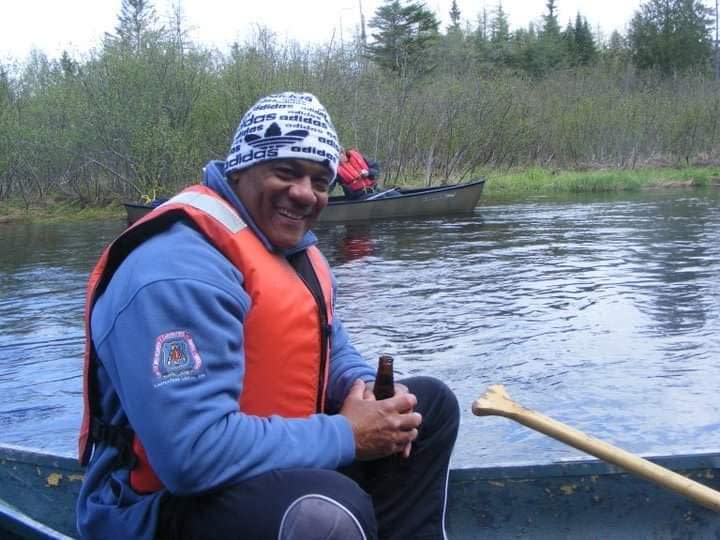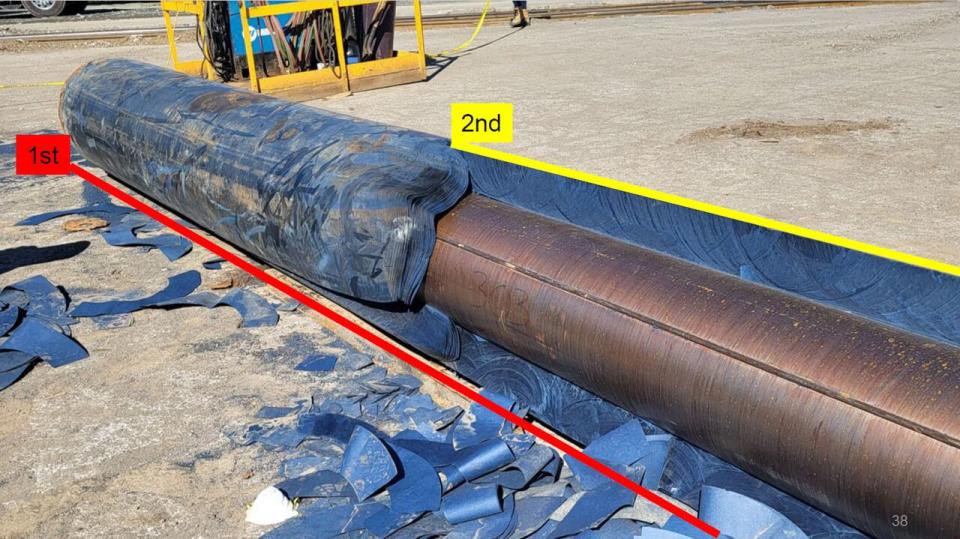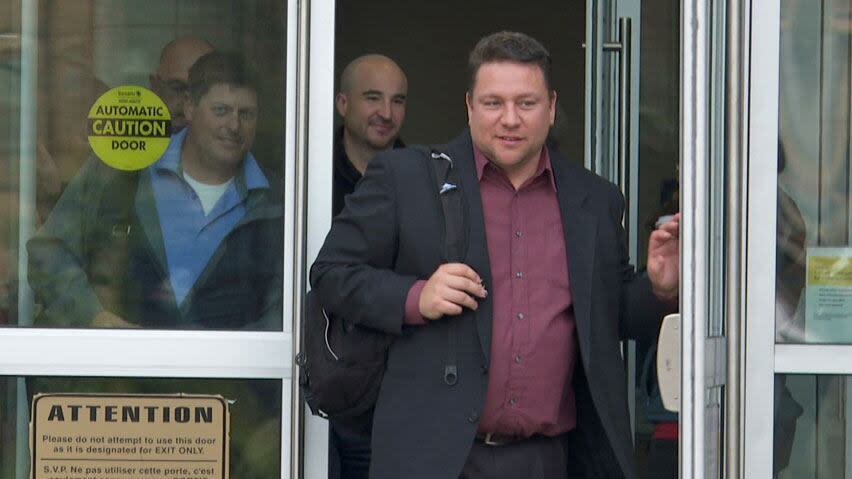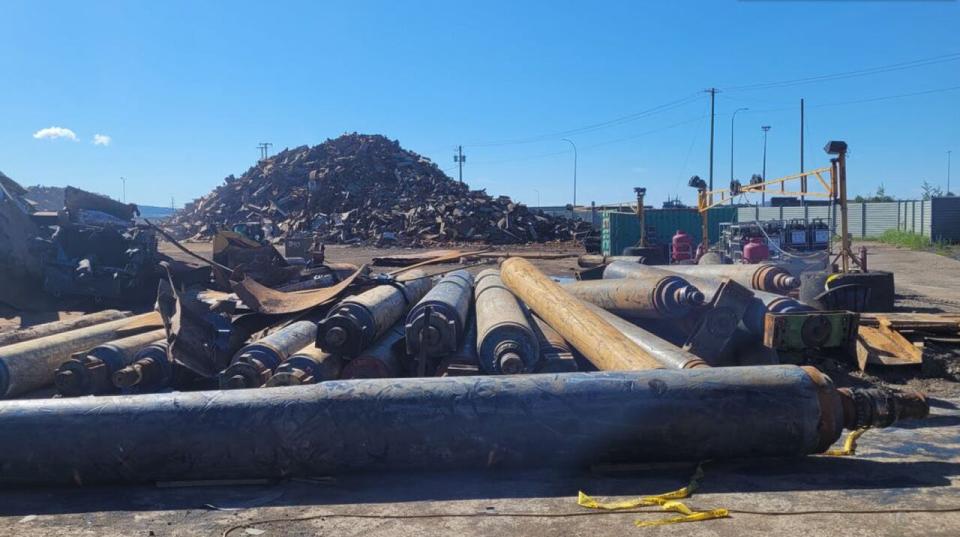Inquest into death of worker at Saint John scrapyard hears warning came too late

Justin Richards saw what he thought was a flock of birds shoot up in the sky the day his cousin, and fellow employee, Darrell Richards was fatally injured working at the American Iron & Metal scrapyard in west Saint John.
But "the way it came down," he soon realized he was wrong, he told a coroner's inquest into Richards's death, fighting back tears.
"At that point, I knew it was Darrell's work location, so I told the yard, 'Has somebody got eyes on Darrell?'"
What he saw was material from the metal shaft of a calendar roll that Richards had been cutting.
The inquest heard Richards, a contractor, was fatally injured at the metal recycling plant on June 30, 2022, around 1:30 p.m., while stripping material from the roll.

The red line illustrates the first cut Darrell Richards made in the calender roll in an attempt to release the blue cotton material, and the yellow line illustrates his second cut, when he was fatally injured. (Michel Cyr, WorkSafeNB)
These large cylinders are used in paper production. They weigh about 54,000 pounds, and the cotton material around them is held under 2,600 tonnes of pressure, said Michel Cyr, manager of investigations for WorkSafeNB.
Richards, 60, was sitting on the calender roll when he cut into it with a circular saw, said Cyr. The sudden release of energy severed his femoral artery and caused severe blood loss. He died in the hospital about 12 hours later.
Inquest sees video of incident
Cyr played a short security video of the incident for the inquest, being held at the Saint John courthouse. It shows a distant silhouette of Richards working alone and then numerous pieces of blue material flying several feet into the air before being widely dispersed across the job site.
Several members of his family, who were seated in the front row, quietly wiped away tears. Jessica Bungay, a lawyer representing AIM, is also attending the proceedings.
Justin Richards, who works as an operator for AIM, testified he had been helping his cousin shortly before the incident.

Michel Cyr, manager of investigations for WorkSafeNB, said it sounds like a shotgun when the pressure is released from a calender roll, and it can lift the entire roll, which weighs tens of thousands of pounds, off the ground a few inches. (Graham Thompson/CBC)
Richards had already cut the length of the calender roll but the material failed to release, so he asked Justin to use a piece of machinery to pick up the calender roll and drop it on the ground six times to see if it would break free, he said.
That didn't work either so Richards "gave me direction on where he wanted it placed and then I went on with my day," sorting material.
It was when Richards attempted a second cut that the material released and struck him in the groin, causing his injuries, the inquest heard.
Warned about dangers hour after incident
According to Cyr, American Iron & Metal in Maine called the Saint John facility about an hour later to explain how dangerous the calender rolls were and how best to process them.
The rolls came from the Maine facility, he said, noting there is no official way to share information between AIM locations.
AIM in Maine purchased the rolls from scrap dealers known as United Buyers, he said.
United Buyers got them from ND Paper, who warned of the dangers in an email.
"Before I can release the cloth rolls, can you please email back the process that you will use to safely dismantle them? As we have discussed, these are highly compressed and can dangerously release like a compressed spring letting loose if not dismantled properly," Dave Falk, director of fixed asset management with ND, wrote on April 13, 2022.

The other calender rolls at American Iron & Metal's Saint John facility are stored under a blast mat until they can be safely decommissioned, the inquest heard Monday. (Michel Cyr/WorkSafeNB)
"You stated that you are familiar with these rolls and know how to safely dismantle and have experience doing so. Please confirm your process with me so we can finalize approval to release."
George Stevenson replied, saying they use a shear in an open area to "take cotton off steel," then put the rolls in a confined grinding area where specialty blades take the cotton off.
"United Buyers will stand 100 [per cent] responsible for processing these rolls and does not hold ND Paper liable for anything," he wrote.
Remaining rolls stored under blast mat
American Iron & Metal in Maine uses a shear to release the energy from the rolls, or they hire a contractor who uses torches to release the energy, said Cyr.
Although AIM's Maine employees had more than 20 years of experience decommissioning calender rolls, the regional manager didn't know the hazards and shipped them to Saint John because he didn't have the manpower to deal with them, he said.
Workers at the Saint John facility had no experience dismantling calender rolls and were unaware of the danger associated with them, the inquest heard.
The remaining calender rolls are now stored under a blast mat until they can be dealt with safely, Cyr said.
The manufacturer recommends that all cotton calender rolls be returned to them for safe disposal.
The inquest heard from eight witnesses Monday.
A total of 15 are expected, Crown prosecutor Patrick Wilbur told CBC News.
The inquest resumes Tuesday morning. Although the Department of Justice and Public Safety said it's scheduled to last all week, Johnston told the courtroom he expects it to take three days
Company pled guilty in death
In February, a provincial court judge ordered American Iron & Metal to pay $107,000 to establish a workplace safety-focused scholarship at the New Brunswick Community College in the name of Richards, after the company changed its plea to guilty on one of four charges under the Occupational Health and Safety Act.
The company admitted to failing to take every reasonable precaution to ensure the health and safety of any person having access or using that place of employment by failing to provide information on the hazards of a calender roll to Richards.
The Crown withdrew the other three charges against AIM at sentencing — failing to properly protect and train Richards, and failing to make sure work was overseen by trained supervisors.


